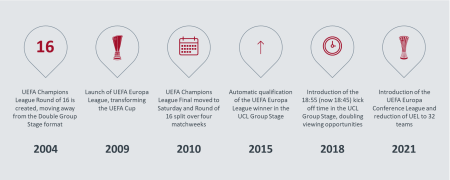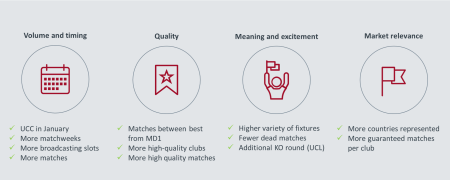
TEAM appointed by Mexican Football Federation to develop and market national team media rights
With a cumulative audience of 166m for the 2022 UEFA Champions League Final — the highest global TV audience for a sporting event during the 2021/22 season — and audiences of 44m and 35m for the UEFA Europa League Final and the UEFA Europa Conference League Final respectively, it’s indisputable that UEFA’s men’s club competitions (UCCs) retain their place amongst the most pre-eminent and sought-after sporting properties in the world(1). But as fan, club, broadcaster and sponsor needs evolve, so too must the UCCs. UEFA’s challenge is to ensure that the strategy behind any evolution of the UCCs strikes the right balance between respecting tradition and nurturing innovation, as well as between maximising commercial value and enhancing sporting appeal.
TEAM’s Strategy department, with its primary focus on driving incremental commercial value for the UCCs, invests significant time and resources to bring a commercial perspective to the extensive and detailed competition format development work that UEFA undertakes. We’re proud to have contributed our commercial expertise to the numerous UCC format enhancements implemented by UEFA over the years — from restructuring the UEFA Champions League to introducing access innovations and launching new competitions.
UEFA leads the process of developing competition format proposals. TEAM’s role is to assess these ideas from a commercial perspective by applying our unique in-house evaluation methodology. It’s an approach that we have developed across multiple UCC cycles and which draws upon our in-depth understanding of the intricacies of the UCCs, the UCC sales proposition and the likely impact of format changes on current and potential commercial partners.
Our approach also recognises that UEFA requires the evaluation methodology to be transparent and objective and to demonstrate that the resulting recommendations are based on a clear and robust rationale.
Standardising our evaluation methodology allows us to assess a wide variety of potential changes to the UCCs, as well as benchmark these changes against other properties. There are four key value-drivers that inform TEAM’s commercial recommendations on format changes:
An analysis of the likely impact of competition format changes on all four drivers helps us to assess which format changes will create the most value for the commercial partners and provide fans and clubs with more competitive, fair and engaging competitions.
The process of evaluating competition format enhancements starts well in advance of each UCC cycle. For the 2024-27 cycle, the evaluation process started almost three years before the start of the sales cycle and almost five years before the first ball is even scheduled to be kicked.
First UEFA reviewed the existing 2021-24 UCC formats and TEAM helped to articulate the commercial strengths and weaknesses. Next, UEFA prepared and presented several exploratory format proposals, taking into account the interests of key stakeholder groups, such as the clubs, the ECA and the fans. Our involvement showcased the benefit of continuity — not only was TEAM able to apply a tried-and-tested evaluation methodology to the innovative format options identified by UEFA, but we were able to rely on the depth of our long-term relationships with UEFA’s commercial partners and the wider marketplace. This allowed us to focus on those changes with the potential to provide optimal value whilst avoiding disrupting the existing format value.
This stage included significant quantitative and qualitative analysis, such as running simulations and forecasts to assess the likelihood of early qualification to the knock-out phase in each format type. As a result, we were able to produce a shortlist of the most commercially-optimal format ideas. From TEAM’s commercial recommendations, UEFA was ultimately able to identify the new League System model as the format with the highest commercial value and sporting appeal for all three UEFA men’s club competitions.
Once the League System model was determined, TEAM helped UEFA define and perfect the specific details of competition access, structure and scheduling — 32 or 36 teams? Which competitions should have a higher increase in matchweeks? On which weekdays should games take place? Every decision was carefully weighed and influenced by the value-drivers, as shown in the graphic below.
It naturally takes time for any changes to such well-established competitions to be accepted by stakeholders, the media, the commercial partners, fans and the wider public. However, initial media rights sales for the 2024-27 cycle in the UK and France saw a significant uplift in media rights fees – a strong indication of the recognition by media partners of the additional value created by the new competition formats.
As Maxime Saada, President of French broadcaster Canal+ explained in an interview with L’Équipe: “They [UEFA and TEAM] won the bet but they did the job. With their new Champions League formula, there will be more French clubs qualified directly [three compared to two currently], more European match nights, more matches…all of this justifies the inflation. When federations and leagues focus on the development of their product, when they focus on improving its quality, this is reflected in the price paid by broadcasters.”
By consistently applying the proven value-drivers to its commercial evaluation of every potential UCC format change, TEAM is able to make recommendations that can be trusted by UEFA and the clubs and to play a key role in the continuing success of Europe’s leading club competitions.

